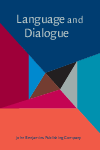
Language and Dialogue
Scope & Guideline
Exploring the Intersections of Language and Culture
Introduction
Aims and Scopes
- Investigating Dialogue Across Contexts:
The journal focuses on dialogue as a dynamic process occurring in various settings, such as health communication, educational environments, and political discourse. It examines how context shapes communicative practices and participants' interactions. - Interdisciplinary Approaches to Language:
By integrating perspectives from linguistics, sociology, psychology, and cultural studies, 'Language and Dialogue' encourages researchers to adopt holistic approaches to understanding language use and its implications in social settings. - Exploration of Social Identity and Power Dynamics:
The journal emphasizes the role of dialogue in constructing social identities and negotiating power relations. It investigates how language reflects and shapes group identities and social hierarchies. - Pragmatic and Discourse Analytical Frameworks:
Utilizing various theoretical frameworks, including pragmatics and discourse analysis, the journal examines linguistic features and their functional roles in communication, contributing to a deeper understanding of meaning-making in dialogue. - Dialogue in Digital Communication:
With the rise of online interactions, the journal explores how digital platforms influence dialogue, focusing on aspects such as interactivity, community building, and the negotiation of meaning in virtual spaces.
Trending and Emerging
- Health Communication in Dialogue:
The journal has seen a surge in research exploring health communication, particularly in online settings. Studies focus on how patients and healthcare providers navigate dialogues around medical knowledge, enhancing understanding and support. - Digital and Online Dialogues:
There is a growing interest in examining dialogue within digital platforms, including social media and virtual communication. This trend reflects the increasing relevance of online interactions in contemporary society and their implications for identity and community. - Ethnopragmatics and Cultural Contexts:
Emerging themes in ethnopragmatics highlight the importance of cultural contexts in shaping communicative practices. Research in this area examines how cultural norms influence dialogue, promoting a deeper understanding of intercultural interactions. - Social Identity and Group Dynamics:
The exploration of social identity construction through dialogue has gained prominence. Recent studies focus on how language is used to negotiate identities and power relations in various social contexts, including educational and political settings. - Dialogic Approaches to Conflict Resolution:
Research focusing on dialogue as a means of conflict resolution, particularly in online support groups and community dialogues, is increasingly prevalent. This reflects a broader societal interest in using dialogue to address disagreements and foster understanding.
Declining or Waning
- Traditional Linguistic Structures:
There has been a noticeable decline in studies centered around traditional linguistic structures and grammar. The journal is shifting towards more contextually-driven analyses, moving away from prescriptive approaches. - Static Analysis of Dialogic Interactions:
Research that treats dialogue as a static phenomenon, focusing solely on isolated instances without considering the broader social context, is becoming less common. The trend is moving towards more dynamic and context-sensitive analyses. - Cultural Homogeneity in Dialogue Studies:
Studies that assume cultural homogeneity and do not account for multicultural perspectives within dialogue are waning. The journal is increasingly prioritizing research that addresses cultural diversity and complexity. - Overemphasis on Formal Models of Dialogue:
There is a decline in publications that heavily rely on formal models of dialogue without empirical grounding. The journal's focus is shifting towards more empirical, contextually rich studies that reflect real-world communication. - Isolated Case Studies:
While case studies remain valuable, there seems to be a decrease in isolated case studies that do not connect with broader theoretical frameworks or dialogues across contexts, as the journal encourages more integrative research.
Similar Journals

Argumentation et Analyse du Discours
Exploring the Dynamics of Discourse and Argumentation.Argumentation et Analyse du Discours is a leading open-access journal dedicated to the exploration of discourse analysis and the intricate dynamics of argumentation within the French language context. Published by the TEL AVIV UNIVERSITY, FACULTY OF HUMANITIES, FRENCH DEPARTMENT ADARR RESEARCH GROUP, this journal serves as a vital resource for scholars and practitioners interested in the theoretical and practical dimensions of argumentation. Since its inception in 2008, the journal has committed to offering innovative research articles that illuminate the interplay between language, culture, and ideology. Researchers and students alike will find invaluable insights within its pages, as it fosters interdisciplinary dialogue and promotes rigorous analysis in the evolving field of discourse studies. With its accessible format and engagement with contemporary issues, Argumentation et Analyse du Discours is essential for anyone seeking to deepen their understanding of communication in a rapidly changing world.
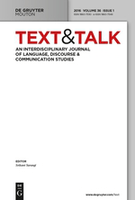
Text & Talk
Illuminating the Dynamics of Language and ContextText & Talk, published by DE GRUYTER MOUTON, is a premier academic journal that serves as a pivotal platform for interdisciplinary scholarship in the fields of Communication, Linguistics, and Philosophy. With its ISSN 1860-7330 and E-ISSN 1860-7349, this Germany-based journal has established a robust presence since its inception in 2005, continuing through 2024. Currently ranked in the Q1 category for both Linguistics and Philosophy, and Q2 in Communication, Text & Talk demonstrates a significant impact within the scholarly community, as reflected in its impressive Scopus rankings across various disciplines. The focus of the journal is to foster rigorous discussions and innovative research on the multifaceted nature of spoken and written discourse, making it indispensable for researchers, professionals, and students eager to explore the interplay between language, context, and communication practices. As an open access title, it enhances visibility and accessibility to cutting-edge research, further solidifying its role as a vital resource in the academic landscape.

International Review of Pragmatics
Elevating Scholarly Dialogue Across Communication FieldsInternational Review of Pragmatics is a leading scholarly journal published by BRILL, renowned for its contribution to the fields of Communication, Linguistics and Language, and Psychology. With an ISSN of 1877-3095 and an E-ISSN of 1877-3109, this journal offers a rigorous platform for high-quality research and theoretical contributions that explore the complexities of pragmatics across various domains. Situated in the Netherlands, the journal is currently ranked in the Q2 quartile for both Communication and Linguistics, reflecting its substantial influence and academic excellence. The Scopus rankings further emphasize its importance, with percentile rankings in the 55th to 78th range across several relevant categories. Since its inception in 2014, the journal has consistently pursued the objective of fostering interdisciplinary dialogue and advancing scholarly discourse in pragmatics. Although the journal does not currently offer open access options, it remains committed to accessibility in academia through various channels. Researchers, professionals, and students alike will find valuable insights and contemporary discussions that propel the field forward, making International Review of Pragmatics an essential resource for those dedicated to understanding the intricacies of human communication.

Revista de Investigacion Linguistica
Advancing linguistic knowledge for a global audience.Revista de Investigacion Linguistica is a distinguished open-access journal dedicated to the exploration and advancement of linguistic research, published by the University of Murcia since its inception in 1997. With the ISSN 1139-1146 and E-ISSN 1989-4554, this journal serves as a vital resource for linguistics scholars and enthusiasts around the globe. Located in the vibrant city of Murcia, Spain, the journal aims to foster academic discourse by disseminating high-quality research that covers a broad spectrum of linguistic topics, including syntax, semantics, phonetics, and sociolinguistics. Its commitment to open access ensures that knowledge is freely available, promoting a wider reach and impact in the academic community. By contributing to the advancement of linguistic studies, the Revista de Investigacion Linguistica plays a crucial role in shaping contemporary linguistic theories and practices, making it an essential publication for researchers, professionals, and students alike.
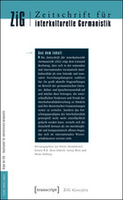
Zeitschrift fur Interkulturelle Germanistik
Advancing Interdisciplinary Perspectives on Language and IdentityZeitschrift für Interkulturelle Germanistik is a leading academic journal specializing in the field of intercultural studies and German linguistics. Published by TRANSCRIPT VERLAG, this journal serves as a platform for innovative research, critical essays, and interdisciplinary discussions that explore the complexities of cultural interactions within the German-speaking world and beyond. With a commitment to fostering scholarly exchange, the journal invites contributions that delve into themes such as language, identity, migration, and cultural dialogue. Although the journal does not currently offer open access, its robust editorial standards are aimed at providing readers with high-quality, peer-reviewed content. Researchers, professionals, and students engaged in German studies will find this journal an invaluable resource for the latest findings and theoretical advancements in intercultural communication and Germanistik. For more information, visit TRANSCRIPT VERLAG's official page.
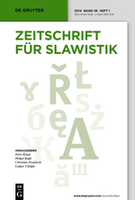
ZEITSCHRIFT FUR SLAWISTIK
Illuminating the Path of Slavic Linguistic InquiryZEITSCHRIFT FUR SLAWISTIK, published by WALTER DE GRUYTER GMBH, is a renowned journal focusing on Slavic studies, encompassing various fields such as cultural studies, linguistics, and literary theory. With its ISSN 0044-3506, this distinguished journal has been a significant contribution to the academic community since its inception in 1956, continuing to disseminate valuable research until 2024. While maintaining a strong reputation within several academic categories, ZEITSCHRIFT FUR SLAWISTIK holds a Q3 ranking in Cultural Studies and Linguistics and Language, and a Q2 ranking in Literature and Literary Theory as of 2023. This positioning underscores the journal’s impact, particularly as it caters to an audience of researchers, professionals, and students invested in the rich tapestry of Slavic culture and language. Access to this journal is not open; however, its comprehensive articles are crucial for anyone aiming to explore and deepen their understanding of Slavic linguistic and literary traditions. The journal's work is essential in fostering cross-disciplinary dialogue and advancing scholarship in these vital areas.
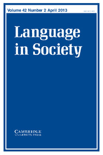
LANGUAGE IN SOCIETY
Unraveling the Ties Between Language and IdentityLANGUAGE IN SOCIETY, published by Cambridge University Press, is a leading interdisciplinary journal that explores the intricate relationship between language and social factors. With an impressive track record since its inception in 1972, this journal has become a critical resource for researchers and practitioners in the fields of linguistics, sociology, and political science, as evidenced by its high ranking in both the Q1 quartile and Scopus percentile rankings. In 2023, it was placed within the top 94th percentile among its peers in language and linguistics and the 93rd percentile in sociology. Furthermore, LANGUAGE IN SOCIETY provides an insightful platform for understanding language as both a social practice and a key element of identity and power dynamics. Although it does not currently offer Open Access options, its rigorous peer-reviewed content remains essential for advancing scholarship and informing professional practice in the study of language in diverse societal contexts. With its scholarly contributions, LANGUAGE IN SOCIETY continues to shape discourse and foster academic collaboration across disciplines.

Philologica Canariensia
Unlocking the potential of literary and linguistic research.Philologica Canariensia is a distinguished academic journal published by the University of Las Palmas de Gran Canaria, focusing on the vibrant fields of Literature and Literary Theory as well as Linguistics and Language. With an impact factor that positions it in the Q1 and Q2 quartiles in its respective categories as of 2023, the journal has established itself as an important platform for scholarly communication and research. Since transitioning to Open Access in 2014, it has broadened its reach, allowing researchers, professionals, and students from around the globe to access high-quality publications without barriers. With a commendable presence in Scopus rankings, including a rank of #309 out of 1106 in Literature and Literary Theory, Philologica Canariensia aims to foster an interdisciplinary dialogue and advance knowledge in the humanities. The journal's commitment to publishing innovative research makes it an essential resource for anyone engaged in exploring linguistic and literary phenomena.

Langages
Advancing Linguistic Scholarship Since 1976Langages is a premier peer-reviewed journal in the field of linguistics, published by Armand Colin, a reputable French publisher known for its commitment to advancing academic scholarship. With an ISSN of 0458-726X and an E-ISSN of 1958-9549, this journal has been an important platform for linguistic research since its inception in 1976, and it continues to engage with contemporary linguistic debates through to 2024. The journal is ranked in the top two quartiles for linguistics and language, reflecting its significance in the academic community, with a Q2 categorization in 2023, and robust Scopus rankings within the 66th to 69th percentiles across relevant categories. Authors and researchers from around the globe contribute to its rich tapestry of scholarly articles that explore the multifaceted nature of language and its role in society, making Langages an essential resource for linguists, educators, and students alike.
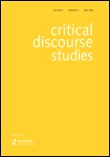
Critical Discourse Studies
Unpacking the Complexities of Communication and CultureCritical Discourse Studies is a leading journal in the field of discourse analysis and communication, published by Routledge Journals, a prestigious imprint of Taylor & Francis Ltd. Established in 2005, it has garnered a significant reputation for its rigorous scholarly articles that explore the intricate relationships between language, power, and social practices. With an impressive Q1 classification in Social Sciences (miscellaneous) as of 2023, the journal serves as an essential platform for researchers, professionals, and students seeking to delve into critical perspectives on discourse analysis. Although not open access, its comprehensive peer-reviewed articles are instrumental in advancing understanding in areas such as sociolinguistics, cultural studies, and communication theory. Critical Discourse Studies thus stands as a vital resource for those engaged in the study of discourse and critical theory, consistently contributing to the dialogue on how language shapes and is shaped by societal structures.